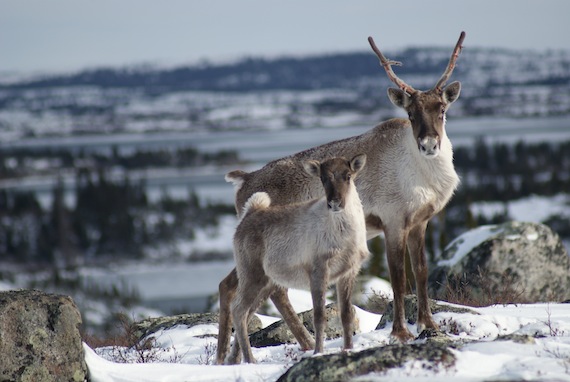Nunavik hunters agree to caribou harvesting restrictions
Nunavik’s regional hunters, fishers and trappers organization, Nunavimmi Umajulirijiit Katujiqatigininga or RNUK, has voted in favour of certain restrictions on the caribou hunt to help boost the populations of dwindling herds.
Nunavik’s George River and Leaf River caribou herds have seen drastic declines in their populations over the last two decades. The George River herd has dropped from roughly 770,000 animals in the 1990s to just under 9,000 today, while the Leaf River numbers have fallen from about 650,000 to under 200,000 over the same period.
That prompted the creation of the Ungava Peninsula Caribou Aboriginal Round Table, made up of seven Indigenous groups. The partners signed a cooperative wildlife management agreement last month, pledging to adapt to the population’s highs and lows and better monitor the herds’ populations.

The Quebec agreement has agreed to close its sports hunts of the herds by February 2018, but up until now, Nunavik hunters had not formally agreed to any changes to their own harvest.
The RNUK voted Nov. 16 to make some changes, including a ban on harvesting pregnant caribou over a three-month period between March and May.
The resolution also specifies that:
• firearms used to hunt caribou must be long rifles with a caliber greater than .22
• all edible meat obtained from a hunt should be retained, including skins
• no caribou calves will be accepted for sale through the hunter support program
• the use of caribou meat to feed dogs will be discouraged
• local hunters, fishers and trappers groups will monitor the local harvest of caribou
Those restrictions will stay in effect until the herds begin to rebound, the resolution said.
But the RNUK stopped short of imposing quotas, as are in place for the caribou harvest in Nunavut, where herds have also seen a decline.
Adamie Delisle-Alaku, co-chair of the caribou roundtable and vice president of resource development at Makivik Corp., presented the resolution to Kativik Regional Government councillors in Kuujjuaq on Wednesday, Nov. 29.
Delisle-Alaku urged councillors to reconsider how and how much they harvest.
“This is very important,” he said. “We’d like the next generation to have caribou for sustenance.”
“This will let the government know that we are doing something.”
For the most part, regional councillors agreed with the new restrictions and with the need to be prudent in future harvests.
“This is our life,” said Tunu Napartuk, a KRG executive council member and Kuujjuaq’s mayor. “Caribou are probably the most important animal in our region. We’re going to work on this and support each other.”
Napartuk urged councillors to send that message to residents in their communities.
KRG councillors also passed a resolution Nov. 29 to prohibit the region’s hunter support program from purchasing the meat of pregnant caribou from harvesters between March and June.